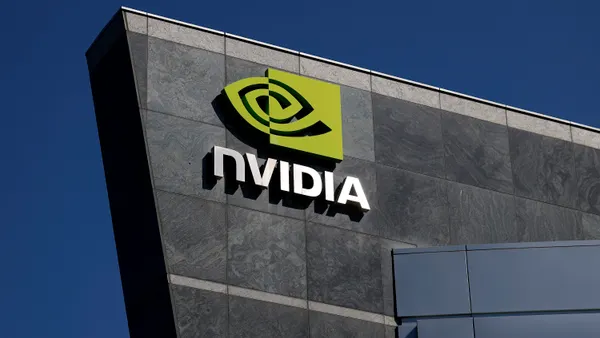Dive Brief:
- Global spending on artificial intelligence (AI) will reach $35.8 billion in 2019, a 44% increase over 2018, according to a new forecast from the International Data Corporation (IDC). By 2022, spending on AI systems is expected to more than double to $79.2 billion, with a compound annual growth rate of 38% from 2018 to 2022. The U.S. will account for nearly two-thirds of all AI spending in 2019.
- Retail is leading global spend on AI systems this year, with the category projected to invest $5.9 billion on solutions like automated customer service agents, shopping advisers and product recommendation platforms. Banking will invest $5.6 billion in AI, including automated threat intelligence and prevention systems, fraud analysis and investigation. Discrete manufacturing, health care providers and process manufacturing round out the top five AI sectors.
- Automated customer service will see the biggest investment this year at $4.5 billion, followed by sales process recommendation and automation at $2.7 billion and automated threat intelligence and prevention at $2.7 billion. Automated prevention maintenance, diagnosis and treatment systems, fraud analysis and investigation, intelligent process automation and program advisers and recommendation systems will have spending exceed $2 billion in 2019.
Dive Insight:
Retailers continue to lead the way in AI investments, as personalization becomes a more important driver of e-commerce sales and consumers demand better customer experiences, including those delivered by automated agents like chatbots and business messengers.
Several recent case studies help to highlight how retail marketers are deploying AI to support their business goals. The men's apparel brand DXL, for example, used the AI-powered interactive content solution InHabit for a campaign that delivered an engagement rate of 6.5% and a dwell time of 21.6 seconds. Six percent of users who engaged with an InHabit unit clicked through to the DXL website, and more than 90% of InHabit engagements were from DXL's target audience of men in the U.S. aged 18 to 50.
Along with personalization and customization, marketers also see AI as helping them boost their campaign effectiveness, targeting and revenue. More than 30% of surveyed B2B marketers believe AI will offer more detailed analysis of campaigns, and 59% report the technology will help them better identify prospective customers, according to EverString and Heinz Marketing research.
While marketers see the benefit of AI, just 9% have a hyper-personalized strategy, which refers to marketing that leverages AI and real-time data, Ascend2 found in a recent study. Most marketers surveyed, or 62%, are just talking about hyper-personalization or haven't done anything concrete about it yet. Improving customer experience and applying data insights to decision-making were top priorities for those concerned with realizing hyper-personalization.











